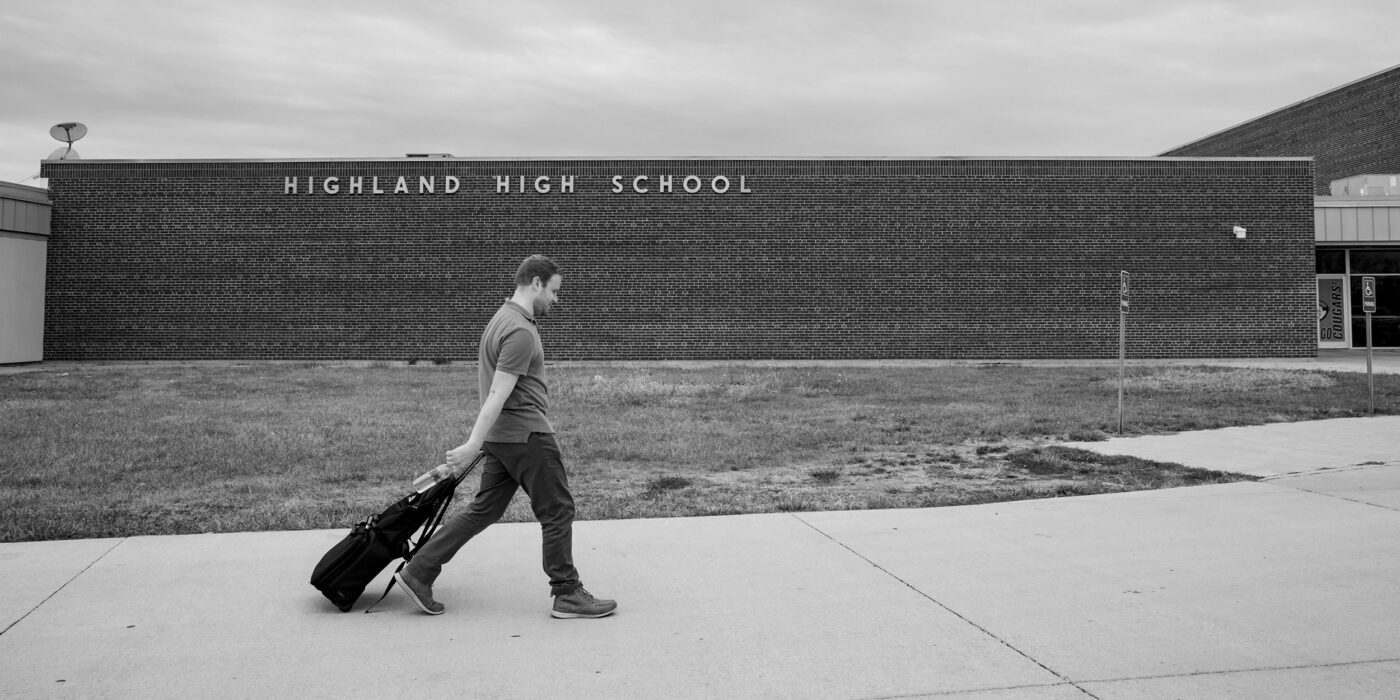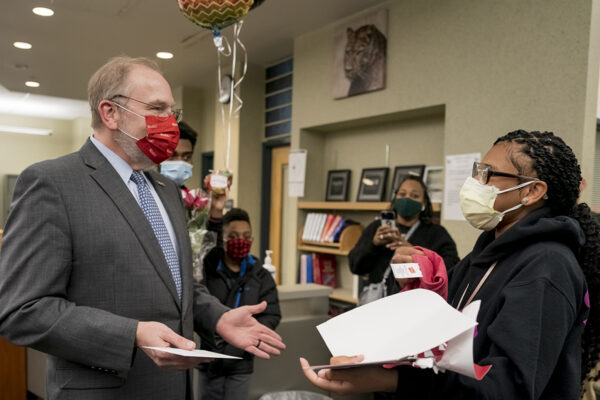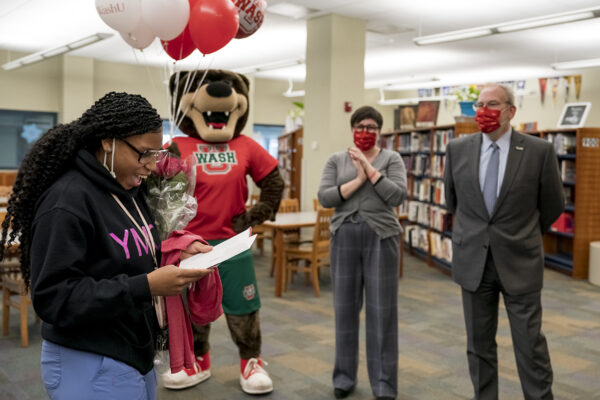“I’d like to know, on a scale from 1 to 5, how familiar you are with WashU? Raise your hand if you know a lot about WashU. Raise three fingers if you’ve heard the name. Raise one if you think we’re in Seattle or Washington, D.C.”
Dacoda Scarlett of Washington University in St. Louis is surveying a small group of students at Palmyra High School in Palmyra, Mo. (population 7,755). It’s his first stop on a two-day recruiting trip through Marion and Lewis counties, a swath of northern Missouri that covers 1,000 square miles and is home to 38,500 people — roughly the population of University City.
Some students hold up one finger. They’ve been to St. Louis, they cheer for the Cardinals, but they don’t know Washington University. Most students raise three fingers. They’ve heard of WashU — that it is good, hard to get into and very expensive.
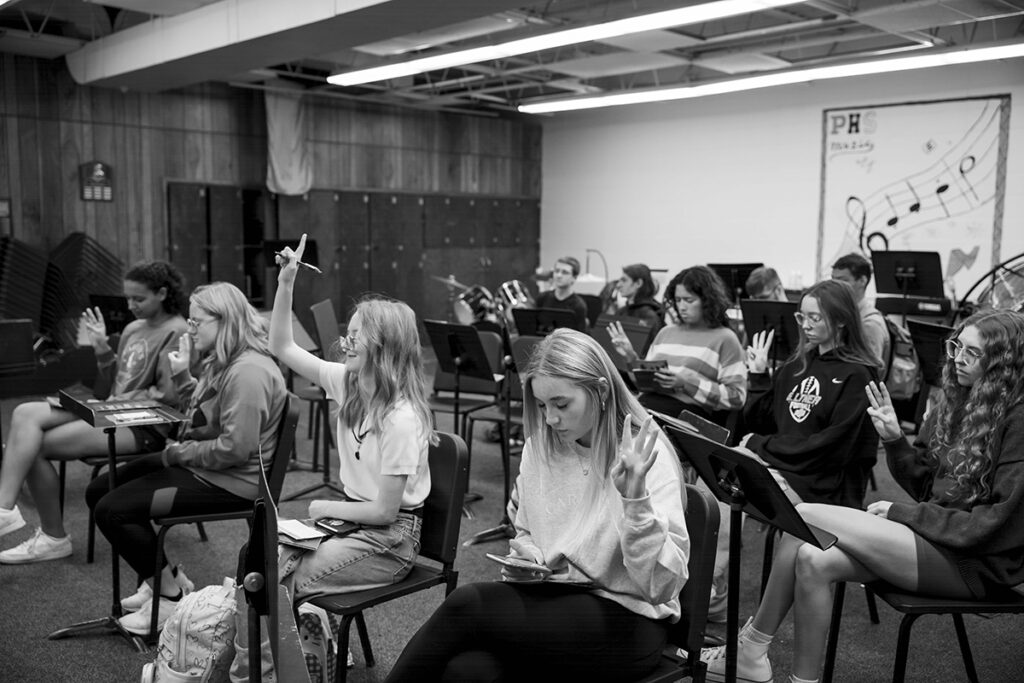
They’ve heard right. WashU is one of the best universities in the nation, with an admission rate of 12% and a tuition of $61,750.
But that’s not the whole story.
WashU has launched two major financial aid initiatives to make the university more affordable, especially for Missouri and southern Illinois students, Scarlett tells the students. There is the WashU Pledge, which provides admitted lower-income students from Missouri and southern Illinois a free WashU education — tuition, meals, books and fees all included. And this year, WashU adopted a no-loan financial aid policy that enables students to graduate debt-free.
“WashU has made a commitment to make sure that all of our students can graduate with no student loans because we truly believe in the value of our students and their ability to change the world,” says Scarlett, inaugural associate director of rural recruitment in the Office of Undergraduate Admissions.
Student Quinley Bond is intrigued. Last year, classmate Jeorgia O’Brien became the first Palmyra graduate in recent history to attend WashU. Bond could be the second.
“I want to be a dermatologist, and WashU has one of the best pre-med programs in the country,” Bond says. “It’s definitely on my list.”
Scarlett’s trip to Palmyra is part of WashU’s Heartland Initiative, a new effort to expand educational access to students from rural communities and small towns in Missouri and southern Illinois. This September and October, Scarlett and his team of Philip Layfield and Lia Garofolo, both assistant directors of undergraduate admissions, have logged nearly 10,000 miles traveling to 80 schools in rural Missouri and Illinois. The effort is funded in part by alumna Joyce Buchheit and her husband, Chauncy Buchheit, of rural Missouri.
Scarlett, from a small town himself, believes WashU has a lot to offer rural students. And vice versa.
“Some people see rural students through a deficit lens because their schools aren’t always well-resourced or have AP classes,” Scarlett said. “What I see are students who have an incredible work ethic and really care about their community. That sounds like a WashU student to me.”

WashU has made a commitment to make sure that all of our students can graduate with no student loans because we truly believe in the value of our students and their ability to change the world.
Dacoda Scarlett
Next stop — lunch at Fiddlesticks in Hannibal, Mo. (population 17,067), with Mary Worthington, the college and career adviser at Hannibal Public Schools. Worthington has been a Missouri educator for three decades and knows everyone in town, including the waitress, a former student.
Scarlett hands Worthington a stack of WashU pamphlets and gets to business.
“Real talk — I want more students from this area at our Rural Scholars Academy next year,” Scarlett says.
The Rural Scholars Academy, also part of the Heartland Initiative, is a free one-week summer program that introduces talented rising juniors who live in Missouri and southern Illinois to life at WashU and St. Louis. Last July, the inaugural cohort of 22 students lived in a campus residence hall, took a class with Sam Fox School of Design & Visual Arts faculty, checked out St. Louis attractions and learned the ins and outs of the college application process.
Worthington is on board. She recently made the transition from elementary school teacher to college adviser and loves helping students — especially those who will be the first in the family to attend college — navigate the college application process. Her position is funded in part by rootED Alliance, which has placed advisers in 200 rural schools in Missouri, Texas and Idaho.
“A lot of our students don’t want to go far away, or they really worry about cost,” Worthington says. “This sort of early exposure will show them what’s possible.”

Back in the hotel in nearby Quincy, Ill., Scarlett files reports on each stop and checks in with Layfield and Garofolo. Most nights, Scarlett will hit the hotel gym or walk around a nearby campus. But tonight, he gets straight to work on his dissertation on rural college access.
“Right now, I’m reading about rural students and the fact that many don’t like to talk about where they are from because they’ve been made to feel ‘country.’ That’s why it’s so important to not only admit rural students, but to create a culture where they feel like they belong,” says Scarlett, who is earning a PhD in higher education administration from Saint Louis University.
Scarlett knows firsthand the power of belonging. He grew up in Clever, Mo. (population 3,020), where he played saxophone in the high school marching band and served as president of the local FFA chapter. Scarlett was set to attend the University of Missouri-Columbia — a lifelong dream — when he abruptly changed his mind.
“I was so excited to go on the campus tour, but on the way home, I realized Mizzou was too big for me,” Scarlett recalls. “My town had one flashing four-way stop light; my graduating class had 65 students. I just couldn’t see myself at a school so big.”
So, Scarlett enrolled at Missouri State University in nearby Springfield, Mo. There, he found supportive mentors and inspiring professors. He also found himself.
“I came to college as a closeted, insecure kid who hadn’t had a lot of exposure to the world,” Scarlett said. “I really blossomed at Missouri State and discovered my voice. That experience made me want to help other students find themselves.”
Scarlett stayed at Missouri State for a master’s degree in higher education and then worked at Lindenwood University before accepting a position at WashU’s First Year Center, now Student Transitions & Family Programs. He loved his job in the Division of Student Affairs so much he hesitated to apply for this newly created position in Undergraduate Admissions.
“But come on — given where I am from, what I care about, how could I not apply?” Scarlett asked. “This role has allowed me to educate students and counselors about the opportunities at WashU and to educate the WashU community about all of the talent that’s right here in our backyard.”
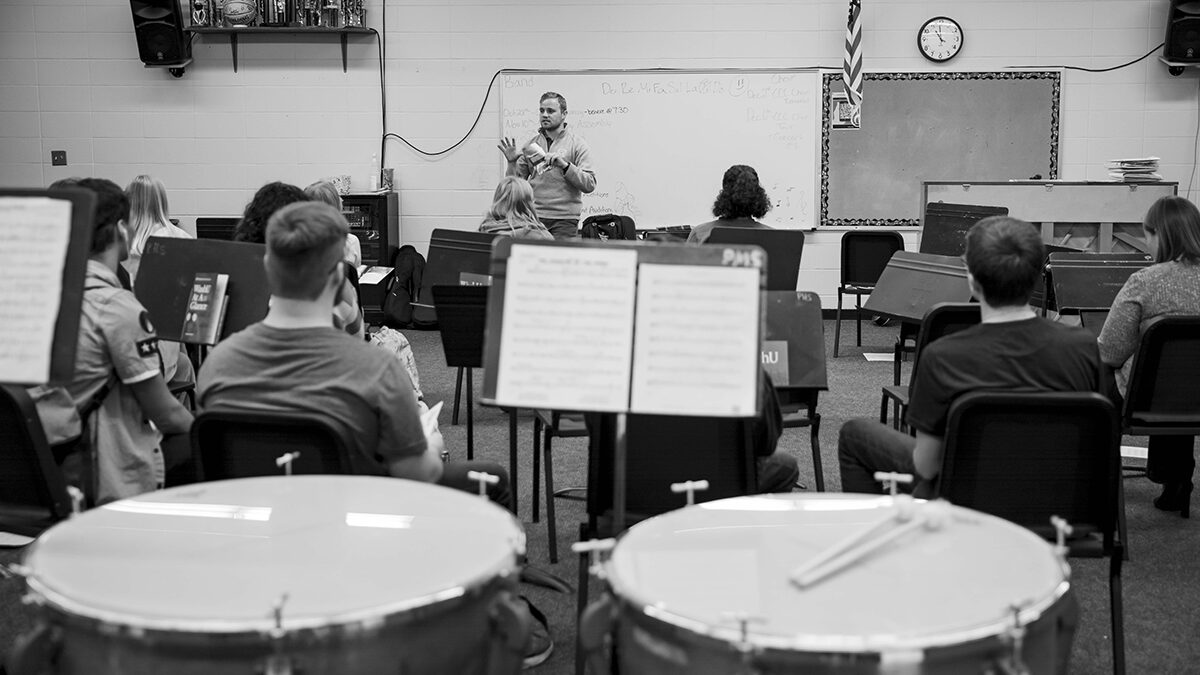
WashU’s Heartland Initiative funds recruiting trips to schools such as Palmyra High School (left) and Monroe City High School (right).

At Monroe, Scarlett runs into Angela Chen, a member of the Rural Scholars Academy, a free one-week program for rural students.
Currently, 31 first-year students are from rural Missouri and Illinois, a number Undergraduate Admissions hopes to double next year. The task is tougher than it sounds. Scarlett’s counterparts in suburban Westchester County, N.Y., or Chicago may meet dozens of prospective students at a single school visit. At Highland High School in Lewistown, Mo. (population 530), Scarlett meets just one — junior Kaley Payton. She tells Scarlett she wants to study data science and listens politely as he describes campus.
“We’re bigger than Quincy University but much smaller than Mizzou or Iowa State,” Scarlett tells Payton. “Being midsize, WashU is a great place to make a fresh start and make new friends and connections without feeling overwhelmed.”
Payton’s interest is hard to gauge, but school counselor Sarah Adam is wowed. She gets on the PA and makes an announcement.
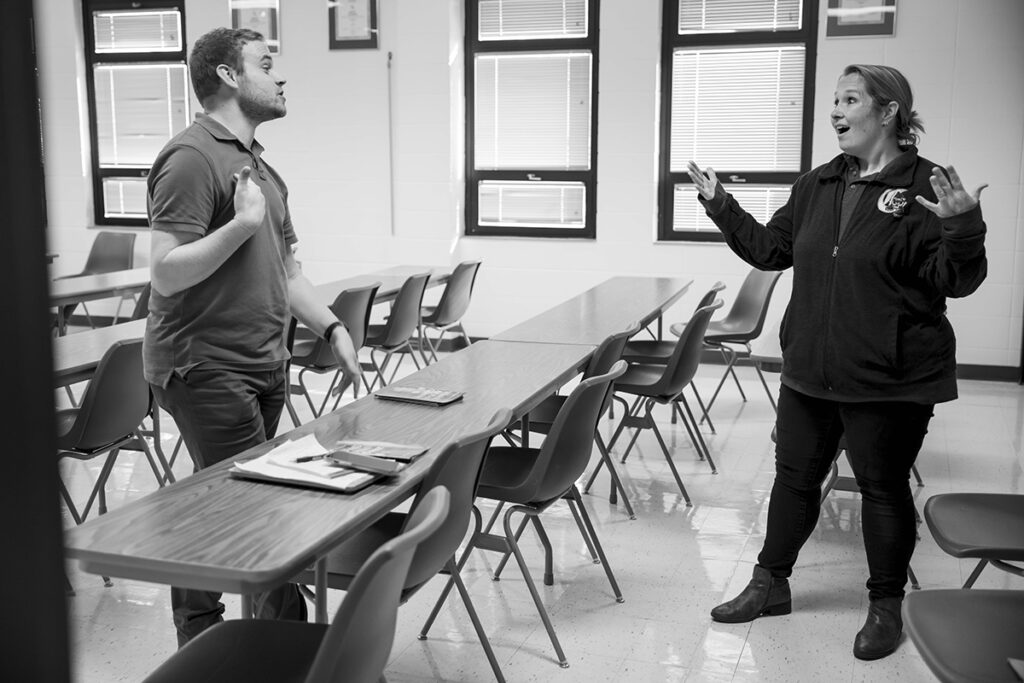
“Hello students,” she says. “I just found out that if you attend Washington University, you’re going to graduate debt free. So, you might want to pop in and learn about their new initiative.”
“That’s what it’s all about,” Scarlett says as he leaves the school. “Now we have another counselor (the school’s rootEd college adviser was out this day) who knows more about WashU and knows who she can call if she has any questions. We haven’t been to a lot of these schools in years, if ever, so it will take time to build relationships, but we’re doing the work.”
As a founding member of the rural access organization STARS College Network, WashU also will host 45 rural counselors from across the nation for two days of workshops. Counselors will learn skills like how to create a school profile, which colleges rely on to understand a school’s resources, course offerings and demographics. Counselors also will meet deans, student financial aid experts and WashU’s rural peer ambassadors. Travel, meals and lodging all will be free.
“The program will be very hands-on and practical,” Scarlett said. “Rural counselors tell us that their needs are different from counselors at suburban schools. They want more foundational information like how to read an award letter and write recommendations.”
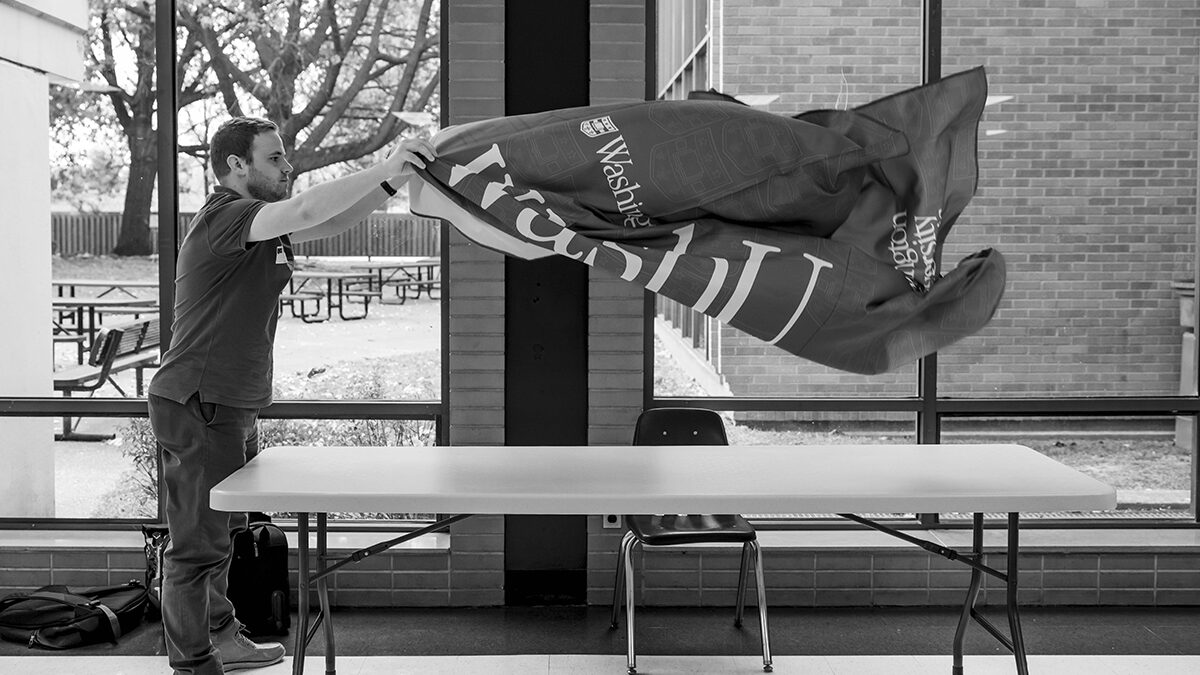
Scarlett sets up a table outside of the Quincy Senior High School cafeteria. Quincy, Ill., has a population of 100,000 but still counts as rural because of its distance from a major city. “People tend to stereotype rural America, but what I always say is, ‘If you’ve seen one rural community, you’ve seen one rural community,” Scarlett says.
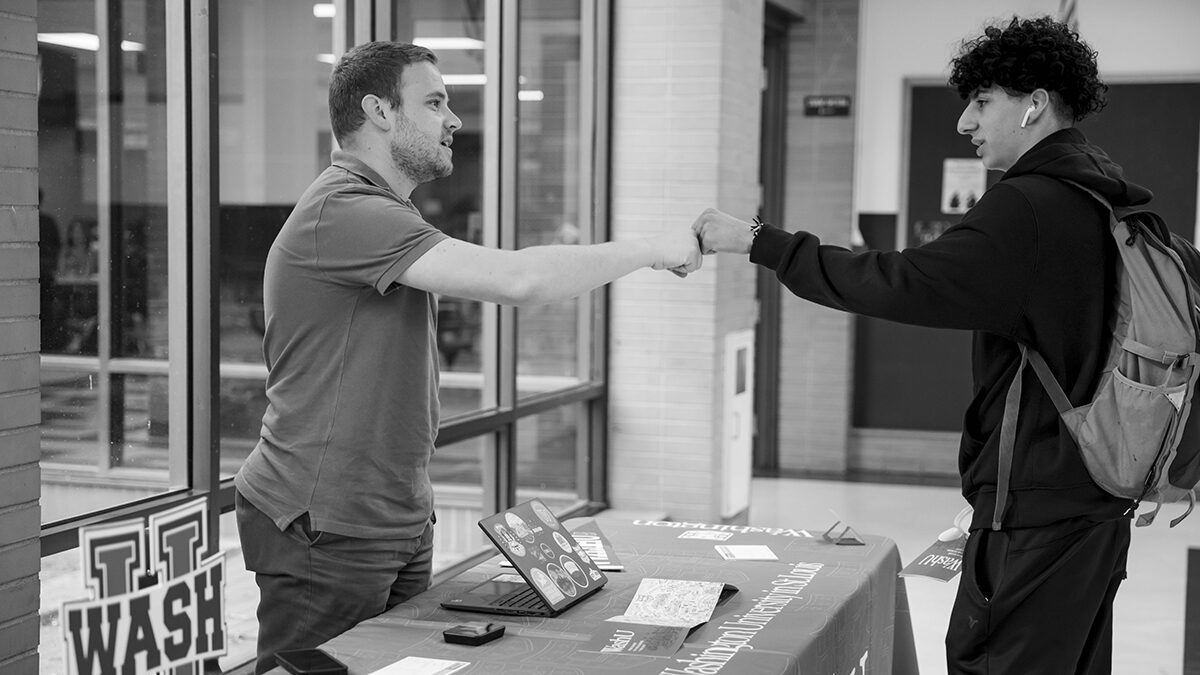
Senior Jason Darian stops by to hear more about WashU’s pre-med curriculum. “Our undergrad students get to participate in research, work on our Medical Campus and get a pre-health adviser,” Scarlett tells Darian.
Scarlett arrives at the last stop of his trip, Canton High School in Canton, Mo. (population 2,641) located near the banks of the Mississippi River. Because the school hosts college visits after the school day, Scarlett expects turnout to be low. So he is thrilled that counselor Jill McAfee, also a rootEd adviser, has convened a group of 20 students representing all grade levels.
Senior Kinsey Biggerstaff asks Scarlett what WashU is looking for in a student.
“Good question,” he answers. “We have what’s called a holistic review process, which means we look at your entire application. We want to know you took rigorous classes — that doesn’t necessarily mean AP and honors classes because we understand not every school has that. WashU also is a place that really values collaboration, so show us how your collaborative spirit will add to our university.”
Scarlett doesn’t always receive such a warm welcome. Some school leaders would prefer their graduates stay close to home. Their concerns are valid. About 60% of rural students who go away to college don’t return. Scarlett didn’t. That said, he knows plenty of rural students who will use their WashU educations to make their hometowns healthier and more prosperous. Others will do that work from afar.
“Yes, you want your best and brightest to come back to you,” Scarlett said. “But you also need rural people in Silicon Valley and Washington, D.C., and New York City advocating for policies and resources that make rural communities stronger.”
Another concern, voiced by McAfee and others, is the cultural chasm that exists between rural communities and urban college campuses. Lewis County, where Canton is located, is 94% white; 71% of its voters voted for President Trump in the last general election.

It’s so important to not only admit rural students, but to create a culture where they feel like they belong.
Dacoda Scarlett
“For the most part, our families here are very conservative, very traditional. To put our culture in St. Louis — that’s a little scary for me,” McAfee said. “Schools talk a lot about diversity. Well, our kids are a diverse population, and I want to make sure that they will be safe; that they will be accepted.”
Absolutely, Scarlett answers. WashU, first and foremost, is a place of learning. And that can only happen if everyone has a voice and the opportunity to learn from one another. That’s why Scarlett is here in Canton. It’s why the university boasts dozens of clubs that celebrate the different identities of its students. It’s why Chancellor Andrew D. Martin speaks out for freedom of expression.
“WashU is proud of its culture and who we are, that’s not going to change,” Scarlett said. “I always encourage students and their families to visit campus and judge for themselves. WashU will not be the best fit for every student. And that’s OK. My job is not to sell WashU but to educate people about what WashU has to offer so they can make the best decision for themselves.”
McAfee will make her first trip to WashU this spring when she attends the STARS Network counselor workshop. Like Worthington, she loves helping students realize their goals, whether that be four-year college or a technical program. She has two bright first-year students who have already decided to apply to WashU.
“It gives me goosebumps to hear them talk about college,” McAfee says. “I want our kids to have every opportunity in the world. They deserve it.”
